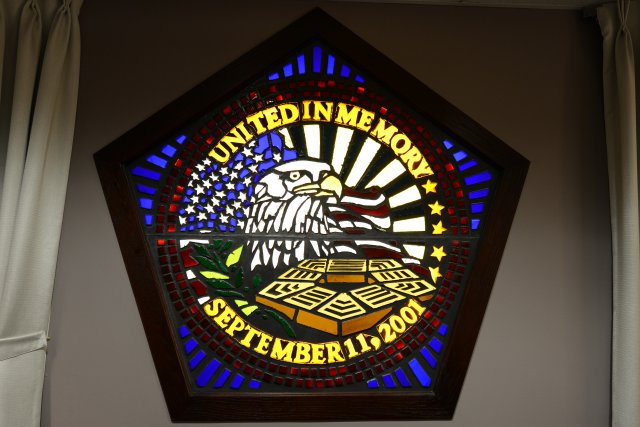By Lisa A. Ferdinando ARNEWS

Pentagon chapel window
WASHINGTON (Army News Service, September 9, 2013) — As the morning sun streams through the stained glass windows, visitors to the Pentagon Memorial Chapel, located at the crash site of the 9/11 terrorist attacks, pause in quiet solitude.
Dedicated a year to the day after the attacks, the chapel is a solemn place for prayer, meditation and reflection, said Col. Thomas C. Waynick, the Pentagon chaplain.
The chapel and adjacent memorial hold special meaning for the nation, he said.
“People come here to the memorial and the chapel because it is a sacred space; something very significant to who we are, and to our history, happened here,” said Waynick, who spoke in an interview ahead of the 12th anniversary of the terrorist attacks.
“It’s a place where people come to grieve, to reflect, to heal. It’s part of the healing process for some people,” Waynick said.
The chapel has five stained glass windows dedicated to the 184 people who lost their lives in the Pentagon and on American Airlines Flight 77.
Throughout the week, services for various faiths are held at the chapel. Those who come to worship there “recognize that this is a special place,” Waynick said.
“I think that adds to the context of their worship, that they’re worshiping in a place that something very tragic happened, but also a place that symbolizes strength and hope and rebuilding and restoration,” he said.
A stained glass window in the front of the chapel is designed like the five-sided “Survivor’s Pin,” which was given to the survivors at the Pentagon. That window includes 184 pieces of red glass, each piece representing one of the victims.
Along the wall that faces the outdoor public memorial are four stained glass windows dedicated to those who perished. Those windows symbolize growth, God’s eternal care, God’s broken heart, grace, and strength, Waynick said.
Dignitaries and visitors from throughout the country and world visit the chapel and memorial.
“People come to honor those who perished here and those who have perished since in defending our freedom and our way of life as Americans,” he said.
The Army chaplain said the attacks had a profound effect on all Americans.
“People come here because their lives, no matter where they were that day, have been affected by what happened right here,” Waynick said.
Prior to September 11, 2001, the Pentagon did not have a permanent chapel, Waynick said. Instead, there was a designated room, such as a conference room, that was used as a chapel.
The memorial chapel, which is open 24 hours a day, is used by Pentagon workers and their guests, and other authorized visitors.
Waynick said the number of visitors to the chapel increases around the anniversary of the attacks.
“It’s not unusual that people will stop by here and tell their stories of where they were that day in the building and what happened that day,” he said.
It is a very special and symbolic place, he said.
“I personally feel very honored that I work here,” he said.

